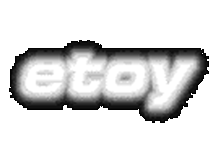by Gar
Smith
The battle between e-commerce and e-creativity broke wide open
in 1999 when the Internet toy giant eToys (http://www.etoys.com/) tried to destroy etoy (http://www.etoy.com/), the eclectic website of a
small group of European artists.
The toy dealers claimed that the artists' site (which pre-dated
the corporation's website) was "disturbing" their customers.

Etoy
logo |
When etoy refused
eToys' $500,000 offer to buy its name, the corporation brought
suit against the artists. On November 29, eToys' lawyers won a
court order shutting down etoy's domain and terminating etoy's
email account.
In the pre-internet era, that would have been the end of it:
David would have been crushed by Goliath. But etoy picked up a
slingshot and loaded it with electrons.
"Hackers are normally apolitical, but [they] have taken eToys'
attack on etoy as an attack on themselves," an Internet message
announced on December 12, 1999.
"Why should global culture be dominated by business?" asked
Ernest Lucha, a spokesperson for RTMark, an anti-corporate website
that has been accused of "illegal practices" for publishing
information critical of the WTO. RTMark (pronounced "registered
trade mark") also created a fake George W. Bush presidential
website, which so provoked the Texas Governor that he declared,
"There ought to be some limits to freedom!"
RTMark sent out a global invitation to hackers to participate
in "a multi-user internet game whose goal is to damage (or
possibly even destroy)" eToys. Almost instantaneously, a "toy
army" of 1,400 hacktivists was "poised to perform 'operations' on
command."
The logic was impeccable: "eToys feels comfortable destroying
art for the benefit of its business, so all the players of this
game can feel great destroying eToys - for the benefit of art."
The RTMark website was flooded with software programs designed
to sabotage eToys' sales during the critical Christmas shopping
season. A ten-day "virtual sit-in" crippled the corporation's
servers. Meanwhile, eToys' investment boards were flooded with
warnings about the attack, prompting many investors to dump their
stocks.
Within days, eToys' stock plunged from $67 a share to $20 -- a
70 percent slide. A major e-attack was set to coincide with the
release of eToys' annual report but, at the last minute, the
beleaguered corporation saw the writing on the screen and agreed
to settle.
The artists won back their domain name and eToys dropped its
suit "without prejudice," agreeing to pay all court costs and
legal expenses.
"This is the Brent Spar of e-commerce," said anti-eToys
campaigner Reinhold Grether (referring to a Greenpeace campaign
that stopped Shell Oil from dumping an abandoned oil-platform into
the North Sea in 1995.) "Just as the petroleum industry learned
that it had to listen to environmentalists, so e-commerce
companies have now learned that the Internet doesn't belong to
them, and they can't do whatever they want with it."
"A precedent has now finally been set," RTMark's Ray Thomas
proclaimed. "eToys thought it could act like corporations
typically do, but it had no idea how the internet works. Now
e-commerce corporations have a choice: Either obtain a legal
stranglehold on the internet so that this kind of defensive
reaction is no longer possible, or behave decently toward the
humans who use this medium for purposes other than profit."
Word of the epic battle is spreading. On January 27, lawyers
for software titan Autodesk demanded that the owners of
The3Dstudio.com abandon its domain name within 15 days or face a
costly lawsuit. (Autodesk markets a software product trademarked
"3D Studio." The3Dstudio does not sell software, but gives away
freeware models and "texture" graphics.)
On February 4, after futile attempts to reach Autodesk to
resolve the issue, The3Dstudio contacted RTMark. One day after
RTMark contacted the software aggressor, an Autodesk attorney
rushed out a response (on a Saturday) calling RTMark's
intervention "premature" and promising prompt action.
On February 7, Autodesk agreed to back off if The3Dstudio would
post a disclaimer that it is not affiliated with Autodesk.
Previous offers to do just that had been ignored by Autodesk. The
company's lawyer expressed relief that "[we] were able to work
things out so quickly" and asked for assurance that RTMark would
not launch an electronic sabotage campaign.
What you can do Visit the etoy artists at http://www.etoy.com/.
Visit RTMark [http://www.rtmark.com/] and check out its website
spoofs on Microsoft, the WTO, and George W. Bush. The hacker
"toys" that were used to bring a corporate giant to its knees are
all stored on the internet [http://www.toywar.com/].







